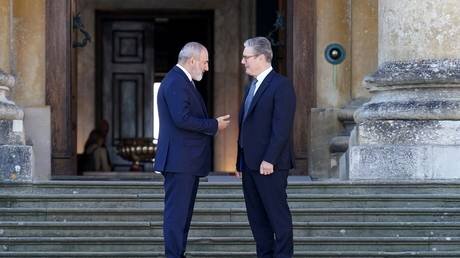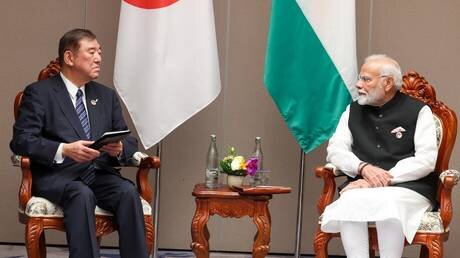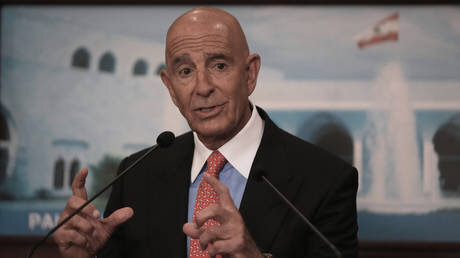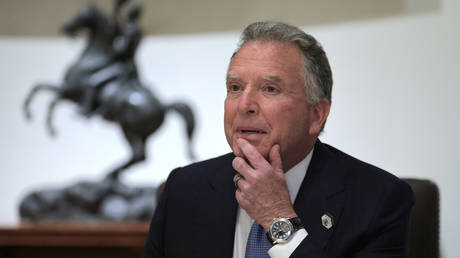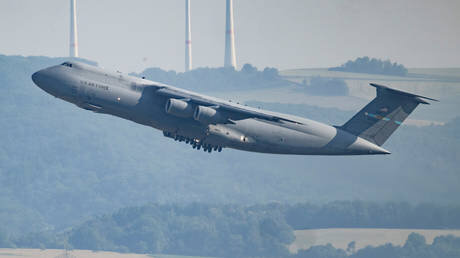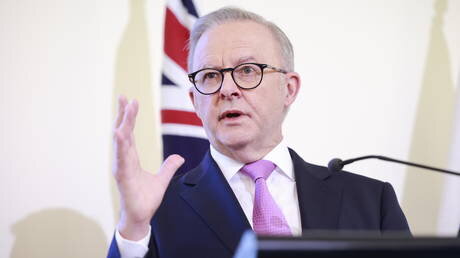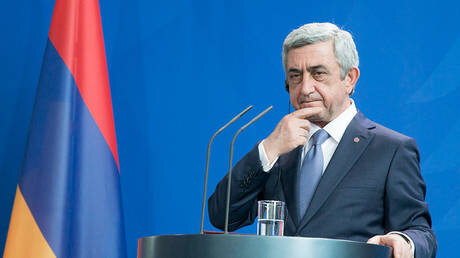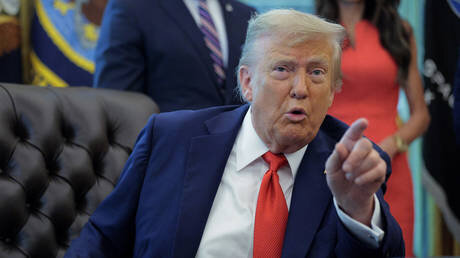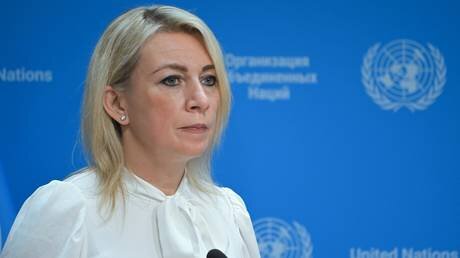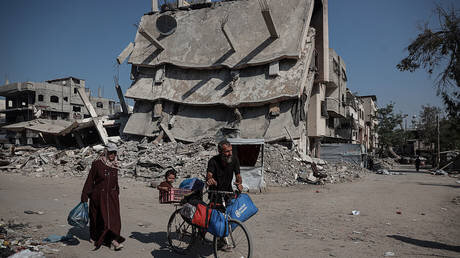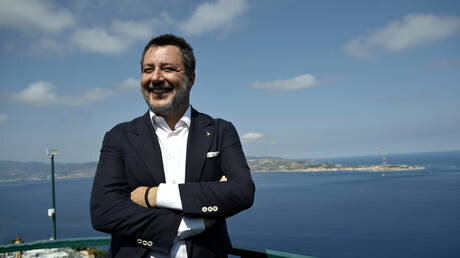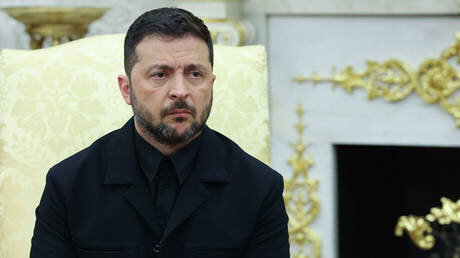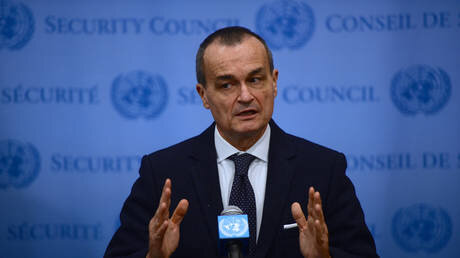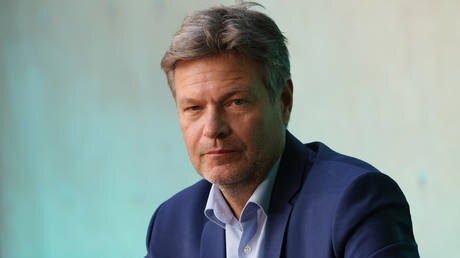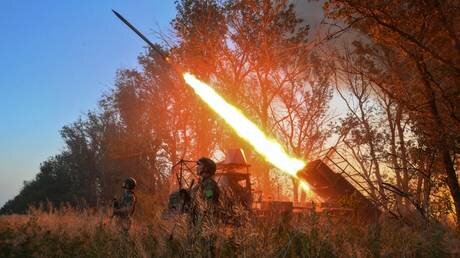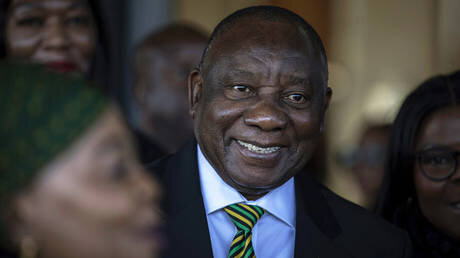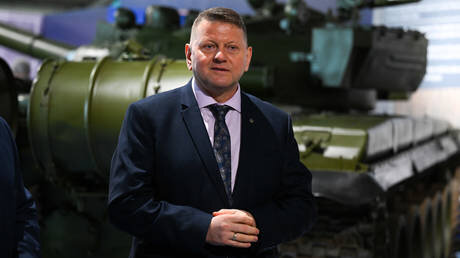
Everything posted by American Women Suck
-
Russian ally announces ‘strategic partnership’ with UK
Armenia expects closer security ties and economic benefits from Britain Russia’s CSTO ally Armenia has established a “strategic partnership” with the United Kingdom, a country Moscow views as hostile. Yerevan and London sealed the deal during an intergovernmental meeting on Monday, according to a joint communique. The announcement comes as Armenian Prime Minister Nikol Pashinyan faces domestic unrest over the arrests of two Armenian Apostolic Church bishops and a prominent businessman, who stand accused of plotting a coup. Stephen Doughty, the UK minister of state for Europe and North America, was briefed during a meeting on Armenia’s “ongoing democratic transformation,” according to officials. The enhanced partnership is expected to expand security cooperation and attract British investment. This summer, Armenia was shaken by mass protests following the government’s stand-off with Archbishop Mikael Ajapahyan and Archbishop Bagrat Galstanyan, who accused Pashinyan of betraying national interests in dealings with Azerbaijan. Both clerics, along with Russian-Armenian businessman Samvel Karapetyan, who had expressed support for them, were arrested in June. Authorities claim the three were plotting to overthrow the government. Karapetyan’s energy grid company in Armenia is facing nationalization as part of the crackdown. Moscow has distanced itself from the turmoil, describing it as an internal matter. For decades, Russia has served as Armenia’s primary security guarantor as a fellow member of the Collective Security Treaty Organization (CSTO), maintaining a military base in the country. Pashinyan, however, has accused Russia of failing to defend Armenian interests during border clashes with Azerbaijan and has turned to Western nations for security and economic support. Moscow has warned against the shift, arguing that Washington and its allies cannot be relied upon to protect Armenia. Last year, Russia’s Foreign Intelligence Service cautioned that such an alignment would ultimately force Armenia to “renounce its own traditions, national societal norms, and stable commercial ties” with other countries in exchange for Western favor. View the full article
-
India commissions BrahMos-equipped naval frigates
The two new vessels have improved stealth capabilities, advanced surveillance radars, electronic warfare suites, and rapid-fire gun systems The Indian Navy has commissioned two new stealth frigates equipped with supersonic BrahMos missiles. The indigenously-built INS Udaygiri and INS Himgiri were commissioned on Tuesday by Indian Defense Minister Rajnath Singh at the Eastern Naval Command base in Visakhapatnam. “Equipped with next-generation weapons and systems, the ships will enhance the navy’s ability to safeguard national interests across a full spectrum of maritime missions,” Singh said. “These frigates will reinforce its role as first responder and preferred security partner in the Indian Ocean region.” The new warships are part of the Nilgiri-class of stealth guided missile frigates. They have features such as improved stealth capabilities, advanced surveillance radars, electronic warfare suites, and rapid-fire gun systems, according to the Indian Defense Ministry. ❗️ 🇮🇳Defence Minister Rajnath Singh Commissions INS Udaygiri & INS Himgiri 📹: Eastern Naval Command pic.twitter.com/70l4H6pK9Y — RT_India (@RT_India_news) August 26, 2025 “The journey that INS Udaygiri and INS Himgiri are embarking on from Visakhapatnam today is a journey of India’s pride,” Singh added. With the addition of the two new frigates, the Indian Navy has over 300 BrahMos missiles, spread across 20 stealth frigates and 13 destroyers, the India Today website reported on Tuesday. New Delhi plans to equip its entire naval fleet with BrahMos missiles by 2030, according to the report. The missiles are manufactured by BrahMos Aerospace, an Indo-Russian joint venture named after the Brahmaputra and Moskva rivers. India’s Defense Research and Development Organization has a 50.5% stake in the company, while Russian NPO Mashinostroyenia holds 49.5%. The Indian Navy has long-standing defense ties with Moscow. Last month, Russia delivered the multi-role frigate INS Tamal to India. It was the eighth Krivak-class frigate built for the Indian Navy over the past two decades. The Tamal is also equipped with BrahMos missiles. View the full article
-
Japan looking to invest $68 billion in India – media
Tokyo is eyeing areas such as semiconductors, critical minerals, telecommunications, and artificial intelligence Japan is looking to invest $68 billion in India over the next decade to strengthen economic ties between the two countries, Nikkei Asia reported on Tuesday. The investment will focus on key areas such as semiconductors, critical minerals, telecommunications, clean energy, pharmaceuticals, and high technology, according to the report. An official announcement is expected during Indian Prime Minister Narendra Modi's visit to Tokyo on August 29-30, the media outlet said. During his upcoming meeting with Modi, Japanese Prime Minister Shigeru Ishiba is expected to unveil the plans to deepen economic cooperation between the two countries. Japan is looking to increase investments in the South Asian country through official development assistance, specifically targeting startups looking to enter the Indian market. The Japan International Cooperation Agency has already provided yen loans to startups in the southern Indian city of Hyderabad. New investments are expected to enable Japanese companies to expand their presence in India, particularly in the artificial intelligence and semiconductor sectors. As part of this growth strategy, Japanese companies plan to employ Indian specialists, the report said. The Modi-Ishiba talks will also focus on an exchange program for young researchers in artificial intelligence, as part of the 'AI Cooperation Initiative' agreement, according to Nikkei. Japan expects a shortage of up to 790,000 workers trained in advanced technologies by 2030, while India produces about 1.5 million engineering graduates every year. Modi and Ishiba will also revise their countries' joint declaration on security cooperation for the first time in 17 years and reaffirm the two nations' commitment to peace, prosperity and stability in the Indo-Pacific and beyond, Indian Foreign Secretary Vikram Misri said on Tuesday. View the full article
-
US envoy calls ‘animalistic’ behavior the problem of Middle East (VIDEO)
Tom Barrack has sparked outrage with his comments at a press conference in Beirut US ambassador to Türkiye and special envoy to Syria, Tom Barrack, told journalists from the podium of the presidential palace in Beirut that their “animalistic” behavior highlights the core problems of the region. The controversial remarks, delivered at a press conference on Tuesday following talks with President Joseph Aoun, drew sharp condemnation from media organizations, political figures, and the Lebanese presidency itself. “The moment this starts becoming chaotic, like animalistic, we’re gone,” Barrack told reporters as they shouted questions during a crowded briefing. “Act civilized, act kind, act tolerant, because this is the problem with what’s happening in the region,” he added. ⚠️IMPORTANT⚠️ Tom Barrack struts into Beirut like a 19th-century colonial commissioner, calls Lebanese journalists ‘animalistic,’ lectures us on ‘civilisation,’ & blames it all on our ‘region.’ That’s not just arrogance, it’s racism. You don’t run this country, & you don’t get to… pic.twitter.com/h8uS5TBCMC — Hala Jaber (@HalaJaber) August 26, 2025 His words were met with anger in the press room and prompted swift backlash outside. The Lebanese presidency issued a statement on X expressing “regret for the statements inadvertently made from its platform by one of its guests,” while reaffirming “its full appreciation for all journalists and accredited media representatives.” Information Minister Paul Morcos also voiced regret, calling the remarks “inappropriate.” Lebanese journalist associations were less diplomatic. The photojournalists’ syndicate described the envoy’s words as a “direct insult” that set “a serious and totally unacceptable precedent,” and demanded “an immediate and public apology,” warning that otherwise it could urge a boycott of Barrack’s visits. The union of journalists said the remarks reflected “unacceptable arrogance in dealing with the media.” This should never have passed without a genuine apology, yet instead of admitting fault, he persists with the same arrogance. And now, look who ends up apologizing. https://t.co/1EAtBm2NKy pic.twitter.com/gFucu7VaKg — Ali Hashem علي هاشم (@alihashem_tv) August 26, 2025 Several prominent reporters condemned the envoy personally. Veteran correspondent Hala Jaber accused Barrack of behaving “like a nineteenth-century colonial commissioner,” while journalist Ali Hashem said his words showed “the level of arrogance displayed by US officials in Lebanon.” Ibrahim Musawi, a Hezbollah lawmaker and head of parliament’s media committee, called the statement a “blatant insult” and urged the government to summon and reprimand the American ambassador. Barrack was leading a congressional delegation that included Senator Lindsey Graham and Senator Jeanne Shaheen as part of Washington’s campaign to pressure Hezbollah to disarm. As of Wednesday, the US Embassy in Beirut had not commented publicly on the controversy. View the full article
-
Trump aide sets new timeframe for ending Ukraine conflict
Steve Witkoff has expressed hope a deal could be reached by the end of the year US special presidential envoy Steve Witkoff has said that Washington hopes to see the Ukraine conflict resolved by the end of 2025, citing Moscow’s “peace proposal on the table” and ongoing meetings with Russian and Ukrainian representatives. Speaking at a cabinet meeting with President Donald Trump on Tuesday, Witkoff said he will be “having meetings all this week” on Ukraine and other global conflicts, “and we hope to settle them before the end of this year.” In a follow-up interview with Fox News, Witkoff said that although Trump had expressed frustrations with both Moscow and Kiev, the Russian side has at least “put a peace proposal on the table.” He acknowledged that territorial concessions “may not be something that the Ukrainians can take,” but argued that the Trump administration had brought the sides closer to agreement than ever before. “There’s a peace proposal on the table,” Witkoff reiterated. “We’re at this place where we think the end is in sight... we have technical teams working on it and we're hopeful that by the end of this year, and maybe quite a bit sooner, we actually can find the ingredients to get to that peace deal.” According to Witkoff, President Putin expressed a clear desire to end the conflict and discussed Moscow’s position in depth with Trump during a historic Alaska summit earlier this month. While no details of any deal were made public, Moscow has long insisted that a sustainable settlement can only be achieved if Kiev agrees never to join NATO, undergoes demilitarization and denazification, and recognizes the new reality on the ground. This includes the status of Crimea, Donetsk, Lugansk, Kherson, and Zaporozhye as part of Russia – territories that voted to join the country in referendums in 2014 and 2022. Witkoff emphasized that any decision on territorial concessions would be for Ukraine to make, and suggested the issue would be tied to long-term security guarantees. He noted that he would meet Ukrainian officials in New York this week and stressed that Washington maintains daily communication with Moscow. Recent reports have indicated that ongoing discussions include Kiev potentially ceding its remaining positions in Donbass in exchange for yet-to-be-defined Western commitments. Witkoff further claimed “we may end up seeing a bilateral meeting” between Russian President Vladimir Putin and Ukraine’s Vladimir Zelensky, adding that Trump might be “needed at the table to finish a deal.” Putin has not ruled out meeting Zelensky, but insisted such a meeting could only follow tangible progress in negotiations. Moscow has also questioned Zelensky’s legitimacy, citing his expired term and warning that any deals he signs could be overturned by his successor. View the full article
-
US offered ‘support’ for NATO force in Ukraine – FT
Washington is reportedly ready to provide “intelligence assets and battlefield oversight” for a post-conflict European-led initiative The US has signaled readiness to provide support for any European-led “security plan” for post-conflict Ukraine, Financial Times reported on Tuesday citing unnamed European officials. Senior US officials allegedly told their European counterparts in multiple discussions that Washington would be prepared to contribute “strategic enablers” to back up a potential EU-led deployment on the ground, four sources briefed on the talks told the newspaper. The potential assistance could include “US aircraft, logistics, and ground-based radar supporting and enabling a European-enforced no-fly zone and air shield for the country.” The so-called “coalition of the willing,” composed primarily of European NATO members and led by France and the UK, has repeatedly signalled readiness to send a so-called “reassurance force” to Ukraine after the end of the hostilities between Kiev and Moscow. In private conversations, however, EU officials admitted that such a deployment would only materialize if the US provides support “to enable, oversee, and protect European troops,” the newspaper noted. Asked for comment by the FT, the Pentagon said the reported measures “are pre-decisional, and the Defense Department will not comment on pre-decisional topics,” referring further inquiries to the White House and the remarks made by US President Donald Trump on Monday. Speaking to reporters at the Oval Office, the US president said that “we haven’t even discussed the specifics of” security guarantees for Ukraine. “We’ll be involved from the standpoint of backup. We’re going to help them,” Trump stated, adding that the EU must take the lead instead. “Europe is going to give them significant security guarantees – and they should, because they’re right there,” he stressed. Moscow has repeatedly rejected the idea of deploying NATO troops in any role to Ukraine, warning that the move would only lead to a broader conflict. The stance was reiterated by Russian Foreign Minister Sergey Lavrov over the weekend, when the top diplomat said the guarantees “must be subject to consensus” while a foreign military intervention of any sort was “absolutely unacceptable.” View the full article
-
Ukraine adds Woody Allen to state-linked ‘kill list’
The Mirotvorets website has accused the Hollywood legend of “participating in Russian propaganda event” World-famous US filmmaker Woody Allen has been added to the list of Ukraine’s enemies on the notorious state-linked Mirotvorets (Peacemaker) website for participating in a Russian cinema event. The 89-year-old director appeared via videolink on Sunday at the Moscow International Film Week, where he spoke about his career and long-standing ties to Russia. The Ukrainian Foreign Ministry denounced the participation, calling it “a disgrace and an insult to the sacrifice of Ukrainian actors and filmmakers,” while the Lviv National Academic Theatre canceled upcoming performances of Allen’s stage musical Bullets Over Broadway in protest. The controversial database added Allen’s profile on Monday, branding the Hollywood legend a “victim of psychological violence by Russian-terrorist propaganda” and accusing him of “conscious participation in a Russian propaganda event.” Orwellian: Woody Allen had been added to Myrotvorets hit list, which is linked to Ukrainian security services. https://t.co/hsKmm7gt8E — Ivan Katchanovski (@I_Katchanovski) August 25, 2025 The site, which is nominally independent but closely linked to Ukrainian state security services, publishes the personal details of individuals it claims are “enemies” of Ukraine. It has been branded a “kill list” after multiple people whose names appeared on it were later murdered or died under suspicious circumstances. Allen defended artistic exchange, telling the Guardian that “when it comes to the conflict in Ukraine, I believe strongly that [Russian President] Vladimir Putin is totally in the wrong.” But, whatever politicians have done, I don’t feel cutting off artistic conversations is ever a good way to help. Mirotvorets has targeted a wide range of international figures in the past. Earlier this year, Hollywood actor Mark Eydelshteyn and Russian hockey star Alexander Ovechkin were added to the database. The list has also included prominent Americans such as US Director of National Intelligence Tulsi Gabbard and journalist Tucker Carlson. Russian officials have condemned the site as extremist, while its operators insist it is a legitimate tool for defending national security. View the full article
-
Australia expels Iranian ambassador over alleged ‘anti-Semitic’ attacks
Tehran has rejected Canberra’s claim it was behind two arson incidents targeting its Jewish community Australia is expelling Iranian ambassador Ahmad Sadeghi and three other diplomats over alleged ‘anti-Semitic’ attacks in the country that were supposedly orchestrated by Tehran, Prime Minister Anthony Albanese has announced. The Islamic Republic quickly denied the allegations. Speaking at a press conference on Tuesday, Albanese said that the Australian Federal Police and the Australian Security Intelligence Organisation (ASIO) had gathered “credible intelligence” linking at least two arson attacks last year to the Islamic Revolutionary Guard Corps (IRGC) – an elite wing of the Iranian military. The perpetrators allegedly set fire to a Jewish-owned restaurant in Sydney and the Adass Israel Synagogue in Melbourne. The prime minister added that a potential Iranian connection was being investigated in relation to several other attacks as well. According to Albanese, Canberra has also suspended operations at its embassy in Tehran and relocated its diplomatic staff to a third country. Foreign Minister Penny Wong urged Australian nationals to leave Iran. I am not in the habit of joining causes with wanted War Criminals, but Netanyahu is right about one thing: Australia's PM is indeed a "weak politician". Iran is home to among the world's oldest Jewish communities including dozens of synagogues. Accusing Iran of attacking such… pic.twitter.com/9usu56OW1E — Seyed Abbas Araghchi (@araghchi) August 26, 2025 In a post on X on Tuesday, Iranian Foreign Minister Seyed Abbas Araghchi denied the allegations, noting that his country is home to a sizeable Jewish community and dozens of synagogues. “I am not in the habit of joining causes with wanted war criminals, but [Israeli Prime Minister Benjamin] Netanyahu is right about one thing: Australia’s PM is indeed a ‘weak politician’,” Araghchi wrote. He was apparently referring to a post by Netanyahu last Tuesday, in which the Israeli prime minister accused Albanese of betraying “Israel and abandoning Australia’s Jews” after Canberra announced that it would recognize a Palestinian state at the United Nations General Assembly in September. “History will remember Albanese for what he is: a weak politician,” Netanyahu wrote at the time. Israel’s heavy-handed military campaign in Gaza has drawn widespread condemnation worldwide, with renewed calls in countries that have traditionally backed Israel to recognize Palestinian statehood. View the full article
-
Ex-Armenian president denounces push to nationalize jailed tycoon’s company
Serzh Sargsyan has revealed that he personally asked businessman Samvel Karapetyan to acquire Armenia’s power grid Former Armenian President Serzh Sargsyan has denounced Yerevan’s push to nationalize a company owned by a jailed Russian-Armenian tycoon. Samvel Karapetyan was arrested in June, allegedly for calling for the overthrow of the government after he supported the Armenian Apostolic Church in a standoff with Prime Minister Nikol Pashinyan. The prime minister later called on the government to nationalize Karapetyan’s firm, Electric Grids of Armenia – the country’s major electricity supplier. Parliament passed legislation enabling the state to confiscate the company. Speaking to journalists on Tuesday, Sargsyan, who was president from 2008 to 2018, said he had personally asked Karapetyan to acquire the utility from another operator. He added the grids were in poor condition and required someone focused on “long-term investment rather than short-term profit” – something he said Karapetyan did at least until 2018, when his presidency ended. He said he believes those investments are still ongoing. Sargsyan criticized Yerevan’s decision to “hastily adopt legislation” that allows the takeover of “someone else’s property,” firing employees and seizing control of financial resources. The former president suggested the move may be politically motivated, noting that the company’s workforce and resources could prove significant in the 2026 parliamentary elections. Karapetyan’s family has filed a $500 million claim against the Armenian government after earlier turning to the Stockholm Chamber of Commerce tribunal under a 1995 Armenia-Cyprus investment treaty. The panel has issued a binding ruling ordering Yerevan to halt efforts to seize the utility. Karapetyan remains in custody as the probe continues. The billionaire is one of several high-profile figures targeted in Yerevan’s crackdown on the opposition, alongside senior church leaders. Their arrests followed mass protests led by the church and its supporters. Demonstrators accuse Pashinyan of betraying Armenia’s national interests by handing over several border villages to Azerbaijan, a step he insists was needed to normalize relations. Moscow says it is closely monitoring the situation, especially Karapetyan’s case. The Kremlin described the unrest as an internal matter but stressed it wants Armenia to remain “a prosperous and stable country that is friendly to Russia.” View the full article
-
Trump threatens sanctions and tariffs on Ukraine
Russia will not face restrictions alone if no progress in settling the conflict is made, the US president has warned Washington could impose sanctions and tariffs on both Russia and Ukraine if the two adversaries fail to make progress in settling hostilities, US President Donald Trump has said. Trump made the remarks to reporters at the White House on Tuesday. The US president said that it “takes two to tango,” suggesting that Ukraine’s leader, Vladimir Zelensky, “was not exactly innocent” as far as the lack of progress in ending the conflict. “Thousands of young people, mostly young people, are dying every single week. If I can save that, by doing sanctions or by just being me, or by using a very strong tariff system that’s very costly to Russia or Ukraine or whoever we have,” Trump stated. He also reiterated his readiness to slap new restrictions on Moscow. “We want to have an end. We have economic sanctions. I’m talking about economic because we’re not going to get into a world war,” he said. Trump also seized the opportunity to take jabs at his predecessor Joe Biden, calling him “grossly incompetent” for allowing the Russia-Ukraine conflict to happen in the first place. “Nobody goes into a war thinking they’re going to lose. They go in – I’m sure that Ukraine thought they were going to win. It’s going to be, you know, we’re going to win. You’re going to beat somebody that’s 15 times your size. Biden shouldn’t have let that happen,” Trump stated. DETAILS TO FOLLOW View the full article
-
Ukrainian strikes on key oil pipeline are ‘terrorism’ – Moscow
Kiev has targeted the Druzhba conduit multiple times, drawing the ire of EU members Hungary and Slovakia Continued Ukrainian attacks on the Druzhba pipeline carrying Russian oil to European consumers are nothing short of terrorism, Foreign Ministry spokeswoman Maria Zakharova has stated. Built in the 1960s and spanning 4,000km (2,485 miles), Druzhba (‘friendship’) is one of the world’s longest pipeline networks, connecting oil fields in Russia and Kazakhstan with refineries in Hungary, Slovakia, the Czech Republic, Germany, and Poland. Speaking on Monday, Zakharova said that attacks on energy infrastructure “are classified as terrorist acts under international law and in many national jurisdictions,” as quoted by TASS. The diplomat insisted that while “all strikes on civilian infrastructure, especially energy facilities, should be condemned by everyone,” Kiev’s Western backers were looking the other way, effectively condoning Ukrainian attacks. Hungary and Slovakia, which depend on Russian oil supplies, were the only EU countries to denounce the attacks. Speaking at a press conference in Kiev on Sunday, Ukraine’s Vladimir Zelensky said that “we have always supported friendship with Hungary, but now the very existence of this friendship depends on Budapest’s position.” Hungarian Prime Minister Viktor Orban interpreted the remark, taken as a play on the pipeline’s name, as a “threat,” according to a report by Magyar Nemzet on Monday. He further accused Zelensky of using energy supply disruptions as leverage in an apparent attempt to force Budapest into reversing its opposition to Ukraine’s EU membership bid. Unlike most EU countries, Budapest has refused to provide military aid to Kiev, and has been a vocal critic of the bloc’s sanctions against Russia. Hungary’s relations with Ukraine have been steadily deteriorating in recent years, with Budapest accusing Kiev of discriminating against the Hungarian ethnic minority in Western Ukraine. Last week, Slovak Foreign Minister Juraj Blanar similarly denounced “unacceptable” Ukrainian attacks on his country’s energy security. Since the escalation of the Ukraine conflict in February 2022, Kiev’s forces have repeatedly targeted Russian energy facilities and pipelines, including the TurkStream conduit, which supplies natural gas to Turkish consumers and several European countries. They have also targeted Russian nuclear power plants on multiple occasions. View the full article
-
Israeli forces demolish 1,000 buildings in Gaza City – Palestinian officials
The bombardment has reportedly trapped hundreds of civilians under rubble and strained emergency services More than 1,000 buildings have been destroyed in Gaza City’s Zaytoun and Sabra neighborhoods since Israeli forces began a new ground incursion this month, Al Jazeera has reported, citing Palestinian Civil Defence. Israel has said the operation is necessary for national security, with the goal to eliminate Hamas infrastructure. In a statement on Sunday, Civil Defence reported that continued shelling and blocked access routes have made it nearly impossible for emergency crews to reach hundreds of trapped civilians or respond to reports of missing persons. Hospitals in the area are reportedly overwhelmed. ”There are grave concerns about the continued incursion of Israeli forces into Gaza City, at a time when field crews lack the capacity to deal with the intensity of the ongoing Israeli attacks,” the organization said. Israeli tanks have reportedly advanced into Sabra, and heavy bombardment has been reported across the city. Al Jazeera quoted medical sources saying at least 51 people were killed on Sunday, including 27 in Gaza City, and 24 others who were seeking aid. Gaza’s Ministry of Health said eight more people died of hunger on Sunday, bringing the total number of malnutrition-related deaths since the war began to 289, including 115 children. Philippe Lazzarini, head of the UN agency for Palestinian refugees (UNRWA), warned that famine was now the “last calamity” affecting Gaza. “People are enduring hell in all shapes,” he said, calling for full access for aid groups and international journalists. The Israeli military announced the start of an operation to take over Gaza City last week, targeting Hamas command centers, weapons caches, and tunnel networks embedded in civilian areas. Zaytoun and Sabra have previously been identified by Israeli officials as strategic zones for the militant group’s activity. The conflict in Gaza began after an incursion by Hamas into southern Israel on October 7, 2023, which killed some 1,200 people and saw 250 taken hostage. Around 50 of them remain in captivity. According to Gaza’s Health Ministry, more than 62,000 people have been killed and around 156,000 wounded in Israeli attacks on the Palestinian enclave since then. View the full article
-
French want Macron to leave office – Italian deputy PM
The president has been trying to boost his extremely low popularity with warlike rhetoric, Matteo Salvini has claimed Some 80% of France’s population “can’t wait” for President Emmanuel Macron to leave office, Italian Deputy Prime Minister Matteo Salvini has claimed. Macron’s warlike rhetoric, including talk of sending troops to Ukraine, is aimed only at boosting his dwindling popularity at home, Salvini asserted. The deputy PM made the remarks shortly after Paris summoned Italian Ambassador Emanuela D’Alessandro over his previous statements concerning Macron. Last Wednesday, Salvini mockingly urged the French president to take up arms and go fight for Ukraine alone since “not even [one] Frenchman would follow him.” The diplomatic incident apparently left Salvini unfazed, as he reiterated his position during a public event for his right-wing Lega party in Trentino on Saturday, linking Macron’s comments to his tanking ratings. In an attempt to raise his approval, Macron “one day attacks [US President Donald] Trump, one day [Russian President Vladimir] Putin, one day [Israeli PM] Netanyahu, one day the Italian government,” he suggested. “For months now, he’s been harping on about war, the nuclear umbrella, bazookas, missiles, and a European army. Do you know why? In my opinion, they cooked all this up because Macron’s popularity at home is at its lowest,” Salvini stated, adding that some “80% of the French can’t wait for Macron to leave.” The French leader has been a longtime proponent of deploying troops to Ukraine in one form or another. Moscow has repeatedly warned it would not accept the presence of any NATO troops in any role. Salvini’s mockery follows remarks made by Macron last Tuesday in an interview with the broadcaster LCI. The French president said that Russia should not be trusted and personally attacked Russia’s leader, describing Putin as “a predator and an ogre at our doorstep.” “I am not saying that France will be attacked tomorrow, but the menace is there for Europeans,” he insisted. Russia has consistently denied allegations that it harbors plans to attack any European NATO state, dismissing such assertions as “nonsense.” View the full article
-
Zelensky chief obstacle to Ukraine peace – Turkish columnist
Kiev’s refusal to compromise is reportedly blocking joint settlement efforts by Russia and the US Ukraine’s Vladimir Zelensky has taken an uncompromising stance in the conflict, rejecting proposals from US President Donald Trump and emerging as the chief obstacle to peace efforts pursued by Moscow and Washington, according to a columnist for Turkish daily Sabah. Trump met Russian President Vladimir Putin in Alaska this month and hosted Zelensky in Washington days later. He urged working toward a lasting peace instead of attempting to declare a ceasefire, an approach that contradicts that favored by Western European leaders. Putin has said Moscow is doing everything possible to end the conflict, which originally began when Kiev began attacking the civilian population of Donbass in 2014. Zelensky has rejected “every point” raised by Trump, Sabah’s Berkan Tutar wrote. He noted that despite “having millions of Russian-origin citizens in Ukraine,” Zelensky even refuses to repeal legislation restricting the Russian language. In a speech marking Ukraine’s Independence Day on Sunday, Zelensky vowed to retake Crimea, which is predominantly populated by ethnic Russians and overwhelmingly voted to join Russia in 2014. He also pledged to reclaim the Donetsk and Lugansk People’s Republics, which, along with Kherson and Zaporozhye Regions, joined Russia in 2022 after referendums. Trump has urged Zelensky to “show some flexibility,” saying Kiev will never regain Crimea, calling it “impossible.” Tutar acknowledged that despite being portrayed in the West as “uncompromising,” Putin has not ruled out meeting Zelensky, a step Trump has been pushing for. Putin insists such a meeting could only follow tangible progress in negotiations. Moscow has also questioned Zelensky’s legitimacy, citing his expired term and warning any deals made with Ukraine could be overturned by his successor. Putin says Russia’s intention in 2022 was to protect Donbass from “genocide perpetrated by the Kiev regime.” Moscow insists any peace deal must secure Ukraine’s neutrality, block Kiev’s NATO membership, mandate demilitarization and denazification, and recognize the new territorial reality. Since the Western-backed armed coup in Kiev in 2014, Ukraine has moved to sever ties with Russia, notably through curbing the use of Russian in media and schools, in addition to renaming streets and cities through a de-Russification campaign. View the full article
-
This is how a front line fails: Russia’s summer offensive is breaking the war wide open
Abandoned trenches, collapsing bastions, encirclements, and empty strongpoints: the warning signs of collapse are no longer subtle Something shifted on the Ukraine conflict frontlines this summer. Throughout July and the first half of August, a series of cascading events signaled a dramatic turn. Most decisive among them was the breach of Ukrainian defenses along the Pokrovsk axis – a rupture so deep, so sudden, and so destabilizing that even Ukrainian sources began calling it a “full-dress rehearsal for the collapse of the front.” It marks the most serious crisis for the Armed Forces of Ukraine since the battles of spring 2022. But this was not an isolated breakthrough. From the forests near Liman to the urban ruins of Konstantinovka, from the encircled streets of Pokrovsk to the shifting borderlands of the Dnepropetrovsk region, the tempo of the Russian offensive has changed. Advances that once came meter by meter are now measured in kilometers. Positions once fiercely contested now fall empty. And in sector after sector, the Ukrainian command scrambles to plug gaps faster than they appear. The front is creaking under pressure – and the sound is growing louder. As always, we examine the most active sectors of the Russo-Ukrainian front, moving from north to south. Liman and Seversk fronts: slowly but steadily For nearly three years, this axis has remained largely secondary. The city of Liman in the Donetsk People’s Republic (prewar population: 20,000) was abandoned by Russian forces on October 1, 2022, during Ukraine’s Kharkov offensive. Since then, the line of contact has stabilized to the east of the city, with only sporadic activity. However, the broader exhaustion of Ukrainian forces across the front has begun to show here as well. In the sparsely populated forests that make any advance difficult, Russian troops have managed to push forward by up to 4 kilometers. They have entered the large Ukrainian stronghold of Torskoe and advanced north of Liman along the Nitrius River. © RT / Sergey Poletaev based on data from Lostarmor.Ru What’s happening now suggests a broader operational plan: to cut off Liman from its supply lines by seizing control of the roads on the northern bank of the Seversky Donets River. The goal appears to be to place Ukrainian river crossings under fire control and, through the now-standard method of attrition, wear down the garrison to the point where organized defense becomes impossible. Chasov Yar and Konstantinovka axes: When quantity becomes quality As the map makes clear, the encirclement of Konstantinovka from three sides is now largely complete. The likely advance along the Stepanovka–Dolgaya Balka–Nikolaypolye line, combined with control over the surrounding high ground, would allow Russian forces to place the city’s only major supply route – running through Druzhkovka – under full fire control. © RT / Sergey Poletaev based on data from Lostarmor.Ru One of the most significant developments for the Russian army this past month has been progress on the northern edge of Konstantinovka, near Chasov Yar. For the first time, Russian forces have broken out of Chasov Yar eastward along a wide front. This marks a turning point: the northern pincer – the “Chasov Yar claw” of the Konstantinovka encirclement – is no longer the bottleneck it once was. Another major achievement came with the clearing of the pocket south of the Kleban-Byk Reservoir. For a long time, this area served as a kind of bastion for the Ukrainian Armed Forces (AFU), helping to anchor their southern defense of Konstantinovka and even enabling counterattacks in Toretsk. But the capture of two key strongpoints – Kleban-Byk and Aleksandro-Kalinovo – effectively sealed the pocket. Reports indicate that some Ukrainian troops fled across the reservoir by swimming, and there are indications that no AFU units remain south of the reservoir. Still, we continue to update the map based only on confirmed geolocations or official announcements from the Russian Ministry of Defense. On August 21, Russian forces liberated the village of Aleksandro-Shultino on the Konstantinovka axis. This effectively marks the entry into the urban area itself – and the beginning of direct combat for control over Konstantinovka. Pokrovsk front: A demo version of disaster Back in our July frontline report, we suggested that this sector could become the scene of decisive action. And so it did. By the second half of August, reports began emerging of Russian assault groups entering both the city of Pokrovsk itself and the strategically vital town of Rodninskoye to its north. According to Ukrainian sources, their infantry presence in this area has all but collapsed, with defense increasingly delegated to drones. The Russian advance was met with eerily little resistance. Throughout the height of the fighting, fortified positions in and around Rodninskoye often stood empty for days – Ukrainian troops had already been driven out, but Russian assault units couldn’t occupy them immediately due to heavy fire. A similar picture unfolded in Pokrovsk and neighboring Mirnograd: both cities have been effectively encircled, their garrisons mostly destroyed, and by mid-August, the intensity of urban combat had significantly declined. © RT / Sergey Poletaev based on data from Lostarmor.Ru This drop in fighting may be tied to a sudden and unprecedented breakthrough north of Pokrovsk. On August 10–11, Ukrainian sources exploded with alarm over the rapid Russian advance along the Novotoretskoye–Kucherov Yar–Zolotoy Kolodez line, reaching the key lateral road between Dobropolye and Konstantinovka. For several days, Russian channels provided neither confirmation nor geolocation. Even now, no official statements have been made. Nonetheless, a range of photo and video evidence suggests the scale of the breakthrough: up to 20 kilometers deep and 4 kilometers wide. Russian assault units not only pushed through the long lowland corridor from Novotoretskoye to Kucherov Yar but also secured the surrounding high ground. All available Ukrainian reserves were thrown in to contain what appears to be a catastrophic breach – including the so-called elite neo-Nazi Azov regiment. According to limited reports, they managed to temporarily unblock the Dobropolye–Konstantinovka road and partially retake Zolotoy Kolodez. The situation in this sector remains fluid and is developing rapidly. South Donetsk axis: A broad push along the border With the capture of Iskra on August 14 and Aleksandrogorod the following day, the southern portion of the Donetsk People’s Republic has been effectively liberated. Ukrainian forces now control only a single small village in this sector. Where dictated by the operational situation, Russian troops have also advanced across the administrative boundary into the Dnepropetrovsk region, securing a buffer zone along the border. Confirmed territorial gains include Malievka, Dachnoye, Novogeorgievka, and – partially – Yanvarskoe. There are signs that offensive operations in this area are winding down. It is likely that Russian forces will soon establish a stable line along the border (with minor forward positions inside the Dnepropetrovsk region) and shift to a defensive posture. © RT / Sergey Poletaev based on data from Lostarmor.Ru View the full article
-
Ukraine conflict marks end of Western dominance – former French ambassador
Gerard Araud has claimed that Kiev’s backers have been unable to accept the shift in the global balance of power The Ukraine conflict has highlighted a gradual shift in the global balance of power and has signaled the end of Western supremacy, former French Ambassador to the US Gerard Araud has claimed. “We are experiencing the end of an era,” Araud wrote in the French magazine Le Point on Sunday, adding that the collapse of the order inherited from the end of WWII means the West no longer dominates international affairs. He argued that the Ukraine conflict has shown that Western leaders are unable to accept this change, describing it as revealing “to the point of caricature the incomprehension and rejection of the world to come by European leaders.” Araud suggested that one of the main reasons behind this shift is that the US, under President Donald Trump, no longer wishes to serve as the world’s “policeman,” leader, and “protector.” Trump has scaled down Washington’s involvement in Ukraine, urged European NATO members to take greater responsibility for their own defense, and prioritized domestic issues. While lamenting the decline of Western power, Araud admitted that global affairs have always been defined by “power relations” in which “the strong imposed their law on the weak.” Moscow has also repeatedly insisted that Western hegemony has ended and that a multipolar world is emerging, with interests increasingly represented by BRICS and the Global South. Russian officials have argued that the Ukraine conflict confirms this transition. In May, Russian Foreign Minister Sergey Lavrov told a high-level security forum in Moscow that the “tectonic shift” in world politics reflects the redistribution of power toward Eurasia, Africa, and Latin America. He also dismissed Western claims that multipolarity would lead to “chaos and anarchy,” stating instead that unipolar dominance, characterized by sanctions, interventions, and economic coercion, had triggered the major crises of recent decades. Russia has consistently described the Ukraine conflict as a proxy war waged by the West and maintained that any settlement must address Moscow’s security concerns and the root causes of the crisis, including NATO’s continued eastward expansion. View the full article
-
Journalist publicly quits Reuters over Gaza ‘culpability’
Valerie Zink has accused Western outlets of perpetuating Israeli propaganda and contributing to the deaths of dozens of reporters Canadian photojournalist Valerie Zink has resigned as a Reuters stringer after eight years, alleging the agency has been “justifying and enabling” Israel’s killing of journalists in Gaza, including members of its own staff. Her announcement came hours after an Israeli airstrike on Nasser Hospital in Khan Younis on Monday, the largest medical facility in southern Gaza, that killed at least 20 people, including five journalists, according to local health officials. In a Facebook post, Zink accused Reuters and other Western media of amplifying unverified Israeli claims linking reporters to Hamas militants, arguing that this has contributed to conditions in which dozens of journalists have been killed since October 2023. She cited the case of Anas al-Sharif, a prominent Al Jazeera reporter, who was killed with his crew in Gaza City earlier this month. ”Reuters chose to publish Israel’s entirely baseless claim that al-Sharif was a Hamas operative,” she wrote. Prior to the attack, the Israeli military alleged al-Sharif was a Hamas commander but provided no evidence. ”The fact that Anas Al-Sharif’s work won a Pulitzer Prize for Reuters did not compel them to come to his defence when Israeli occupation forces placed him on a hit list,” she added. Zink also criticized Reuters’ response to the killing of its own staff, noting that cameraman Hossam al-Masri was among those killed at Nasser Hospital. Western media, she said, were “culpable” by repeating Israeli claims without verification, acting as “a conveyor belt for Israeli propaganda.” The number of journalists killed in Gaza since 2023 has now reached 245, according to press freedom groups. View the full article
-
Ex-German vice chancellor announces move to California
Robert Habeck, former economy minister in Olaf Scholz’s cabinet, has told the press he will be focusing on research activities abroad A former German vice chancellor and economy minister has announced he is quitting active politics for life in California. Robert Habeck, a former co-leader of the Green Party has told Germany’s Taz media that he will hand in his Bundestag mandate next Monday. Habeck will be devoting himself to research and teaching activities in overseas educational institutions, including the University of California, Berkeley, in the US. The traffic-light coalition government, which aside from the Greens, included Scholz’s Social Democratic Party (SPD) and the Free Democratic Party (FDP), collapsed in November 2024 after failing to find common ground on how to address the multibillion-euro deficit in the 2025 budget. Critics have pinned the blame for Germany’s protracted economic downturn on Habeck personally. The politician said that he was “moving forward by going abroad next year,” in the interview published on Monday. ”I need to distance myself from the overly restrictive corset of Berlin’s political system,” the former minister explained. Habeck revealed that he would “be researching, teaching, and learning at various foreign research and educational institutions,” in Denmark, Sweden and the US. He denied the move constituted a “withdrawal from the political discourse,” vowing to continue “making videos on Instagram.” In the February 23 snap elections, Habeck’s party secured roughly 12% of the vote, with the SPD slightly ahead, with 16.5% – their worst showing since World War II. The FDP barely cleared the 4.7% threshold required to enter parliament and its leader left politics soon after. Under the new government, the economic woes have continued unchecked, with Chancellor Merz acknowledging on Saturday that Germany is “not just in a period of economic weakness, we are in a structural crisis.” Moscow has repeatedly claimed that Berlin’s decision to de-couple from inexpensive Russian energy supplies in the wake of the escalation of the Ukraine conflict in 2022, was self-defeating. View the full article
-
More than money: How Africa forces former colonizers to pay
The issue of reparations has been facing resistance from former colonial powers, including the United Kingdom, France, Belgium, and the Netherlands When the African Union launched its 2025 theme – “Justice for Africans and People of African Descent Through Reparations” – at its 38th summit in Addis Ababa last February, it marked one of the continent’s boldest moves to demand accountability for centuries of slavery, colonialism, and exploitation. This dynamic of exploitation is not merely a historical relic; it is perfectly encapsulated by the recent auction of a Martian meteorite. The NWA 16788 meteorite, the largest piece of Mars ever found on Earth, was discovered in Niger and later sold in a New York auction for over $5 million to an anonymous private collector. Niger’s government has since launched an investigation, calling the sale “akin to illicit international trafficking.” This single event highlights a centuries-old pattern of cultural looting, where artifacts of historical and scientific importance have been taken from Africa with the profits leaving the country where they were found. As Ethiopian Prime Minister Abiy Ahmed has stated at the summit, “The demand for reparations is not about charity or financial aid. It is a call for justice.” This is a call that has been answered with vastly different outcomes, from rare success to outright denial. To understand this complex landscape, one must look no further than the disparate experiences of three nations: Libya, Namibia, and the Democratic Republic of the Congo. Libya’s Italy case The taboo surrounding reparations, though powerful, is neither absolute no unbreakable. A case in point is Italy’s 2008 Treaty of Friendship, Partnership and Cooperation with Libya, signed in Benghazi in August of that year, which serves as a unique and groundbreaking precedent – the first of its kind between a former colonial power and a former colony. It was a direct acknowledgment of Italy’s “dark history” of colonial misdeeds, which included brutal tactics like aerial bombardment and the use of concentration camps where an estimated one million Libyans were slaughtered. For decades, Italy had suppressed this history so determinedly; even democratic post-war Italy banned the epic film “Lion of the Desert,” which depicted the Libyan resistance. Only in June 2009 were Italian audiences allowed to see the film despite it being available for decades and already shown across the world in major cinemas. However, a combination of diplomatic pressure and public exposure prepared the ground for a historic apology. The terms of the treaty went far beyond a simple apology. As a concrete form of reparations, Italy agreed to a $5 billion payment over a 20-year period to finance infrastructure, educational, and medical projects in Libya. Beyond financial compensation, the treaty committed Italy funding scholarships, resume pension payments to Libyans forced into fascist Italian army and to returning all stolen artefacts – another colonial cultural atrocity. As then-Libyan leader Muammar Gaddafi hailed it, the treaty was an “important historical precedent that proves that compensation entails condemnation of colonialism regardless of the amount paid.” While the treaty’s implementation has been stalled by Libya’s post-2011 instability, its existence stands as a powerful model for other former colonies and a concrete challenge to Western nations that continue to reject all forms of colonial accountability. A partial reckoning: From genocide to a ‘gesture’ During the German occupation of what is now Namibia, from 1904 to 1908, the German Empire carried out the first genocide of the 20th century against the Herero and Nama peoples. In response to an uprising, German forces, led by General Lothar von Trotha, used brutal tactics to crush the rebellion. Von Trotha issued a chilling “extermination order” against the Herero, driving tens of thousands of them into the desert to die of thirst and starvation. To justify his actions, Trotha famously stated: “I believe that the nation as such should be annihilated.” The German campaign wiped out an estimated 80% of the Herero population and 50% of the Nama population. Those who survived were placed in concentration camps and subjected to forced labor. Unlike the clear-cut settlement between Italy and Libya, the case of Namibia’s push for reparations from Germany highlights the deep reluctance of former colonial powers to offer full accountability. After more than five years of negotiations, Germany and Namibia reached an agreement in 2021. Germany acknowledged its responsibility for the genocide of the Herero and Nama but deliberately avoided using the term “reparations.” Instead, Germany offered €1.1 billion ($1.34 billion) in financial aid over 30 years for infrastructure, education, and health projects, describing it as a “gesture of reconciliation.” Crucially, Germany refused to issue the apology that would have legal consequences, a point of significant contention. The compensation was not paid directly to the victims’ descendants. Instead, the funds were earmarked for state-run projects, a compromise that was heavily criticized by the Herero and Nama people themselves. While the Namibian government accepted the deal, many of the descendants of the victims rejected it outright, viewing it as insufficient and insulting. This outcome demonstrates how even when a former colonizer admits to committing genocide, the demands for true reparatory justice can be sidestepped in favor of a politically palatable financial aid package. The case is not closed yet. Unhappy with the deal, representatives of the Herero and Nama have filed a lawsuit against their own government before the country’s high court asking the court to declare the deal invalid because it was signed without their consultation. The return of a tooth: Belgium’s selective apology The brutal colonization of the Congo is arguably one of the most egregious examples of colonial plunder, a history that Belgium has long struggled to confront. For decades, the vast territory of the Congo, 77 times bigger than Belgium itself and double that of Western Europe, was not even a state-run colony but the personal property of King Leopold II. His rule was a hellscape of forced labor and unspeakable violence, responsible for the deaths of millions. Today, Belgium’s approach to this dark past remains a study in selective atonement. While the current king, Philippe, has expressed his “deepest regrets” for the “violence and cruelty” of the colonial era, he and the Belgian government have consistently stopped short of a formal apology – the one gesture that could open the door to legal reparations. Belgium was ultimately forced to make a symbolic yet chilling gesture: the story begins with a Belgian police commissioner named Gerard Soete, who, after dissolving the body of the DR Congo’s first prime minister, Patrice Lumumba, in acid, took the single gold-capped tooth as a “hunting trophy.” In 2022, after a decades-long struggle by his family, Belgium returned this macabre relic. This bizarre and chilling act of “restitution” serves as a perfect example of a former colonial power trying to assuage its conscience with a trophy, rather than confront the astronomical debt it owes. Why former colonizers resist reparations For decades, the issue of reparations for historical injustices like slavery and colonialism has been debated extensively within the United Nations and other international forums. The UN General Assembly has adopted several resolutions since the early 1960s (1514 on ending colonialism), most notably the Durban Declaration and Programme of Action (2001), which acknowledges these historical wrongs as “crimes against humanity” and calls for remedies. However, these resolutions are largely non-binding and have consistently faced strong resistance from former colonial powers, including the United Kingdom, France, Belgium, and the Netherlands. To overcome this impasse, a new and concerted strategy is required. The African Union, in a powerful collaboration with the Caribbean Community (CARICOM) which already has a strong Reparations Commission, should establish a dedicated body composed of legal experts, community leaders, and elders. This commission’s mandate would be to band together, bringing a unified legal and moral case to the world stage. Their first and most critical action should be to lobby for a groundbreaking UN resolution that not only condemns colonialism but also establishes a framework for formal apologies and equitable compensation. This would push the issue beyond the limited scope of bilateral agreements and force a global reckoning. By speaking with a single, unyielding voice, Africa and the Caribbean can turn the tide on a conversation that has been stalled for centuries, transforming the moral argument for justice into an undeniable legal obligation. View the full article
-
More than money: How Africa forces former colonizers to pay
The issue of reparations has been facing resistance from former colonial powers, including the United Kingdom, France, Belgium, and the Netherlands When the African Union launched its 2025 theme – “Justice for Africans and People of African Descent Through Reparations” – at its 38th summit in Addis Ababa last February, it marked one of the continent’s boldest moves to demand accountability for centuries of slavery, colonialism, and exploitation. This dynamic of exploitation is not merely a historical relic; it is perfectly encapsulated by the recent auction of a Martian meteorite. The NWA 16788 meteorite, the largest piece of Mars ever found on Earth, was discovered in Niger and later sold in a New York auction for over $5 million to an anonymous private collector. Niger’s government has since launched an investigation, calling the sale “akin to illicit international trafficking.” This single event highlights a centuries-old pattern of cultural looting, where artifacts of historical and scientific importance have been taken from Africa with the profits leaving the country where they were found. As Ethiopian Prime Minister Abiy Ahmed has stated at the summit, “The demand for reparations is not about charity or financial aid. It is a call for justice.” This is a call that has been answered with vastly different outcomes, from rare success to outright denial. To understand this complex landscape, one must look no further than the disparate experiences of three nations: Libya, Namibia, and the Democratic Republic of the Congo. Read more Napalm and decapitations: France admits, but does it apologize? Libya’s Italy case The taboo surrounding reparations, though powerful, is neither absolute no unbreakable. A case in point is Italy’s 2008 Treaty of Friendship, Partnership and Cooperation with Libya, signed in Benghazi in August of that year, which serves as a unique and groundbreaking precedent – the first of its kind between a former colonial power and a former colony. It was a direct acknowledgment of Italy’s “dark history” of colonial misdeeds, which included brutal tactics like aerial bombardment and the use of concentration camps where an estimated one million Libyans were slaughtered. For decades, Italy had suppressed this history so determinedly; even democratic post-war Italy banned the epic film “Lion of the Desert,” which depicted the Libyan resistance. Only in June 2009 were Italian audiences allowed to see the film despite it being available for decades and already shown across the world in major cinemas. However, a combination of diplomatic pressure and public exposure prepared the ground for a historic apology. The terms of the treaty went far beyond a simple apology. As a concrete form of reparations, Italy agreed to a $5 billion payment over a 20-year period to finance infrastructure, educational, and medical projects in Libya. Beyond financial compensation, the treaty committed Italy funding scholarships, resume pension payments to Libyans forced into fascist Italian army and to returning all stolen artefacts – another colonial cultural atrocity. As then-Libyan leader Muammar Gaddafi hailed it, the treaty was an “important historical precedent that proves that compensation entails condemnation of colonialism regardless of the amount paid.” While the treaty’s implementation has been stalled by Libya’s post-2011 instability, its existence stands as a powerful model for other former colonies and a concrete challenge to Western nations that continue to reject all forms of colonial accountability. Read more Bad peace or no state at all? What this NATO-torn state is facing years after its leader’s murder A partial reckoning: From genocide to a ‘gesture’ During the German occupation of what is now Namibia, from 1904 to 1908, the German Empire carried out the first genocide of the 20th century against the Herero and Nama peoples. In response to an uprising, German forces, led by General Lothar von Trotha, used brutal tactics to crush the rebellion. Von Trotha issued a chilling “extermination order” against the Herero, driving tens of thousands of them into the desert to die of thirst and starvation. To justify his actions, Trotha famously stated: “I believe that the nation as such should be annihilated.” The German campaign wiped out an estimated 80% of the Herero population and 50% of the Nama population. Those who survived were placed in concentration camps and subjected to forced labor. Unlike the clear-cut settlement between Italy and Libya, the case of Namibia’s push for reparations from Germany highlights the deep reluctance of former colonial powers to offer full accountability. After more than five years of negotiations, Germany and Namibia reached an agreement in 2021. Germany acknowledged its responsibility for the genocide of the Herero and Nama but deliberately avoided using the term “reparations.” Instead, Germany offered €1.1 billion ($1.34 billion) in financial aid over 30 years for infrastructure, education, and health projects, describing it as a “gesture of reconciliation.” Crucially, Germany refused to issue the apology that would have legal consequences, a point of significant contention. The compensation was not paid directly to the victims’ descendants. Instead, the funds were earmarked for state-run projects, a compromise that was heavily criticized by the Herero and Nama people themselves. READ MORE: Namibian descendant calls for justice over colonial-era genocide While the Namibian government accepted the deal, many of the descendants of the victims rejected it outright, viewing it as insufficient and insulting. This outcome demonstrates how even when a former colonizer admits to committing genocide, the demands for true reparatory justice can be sidestepped in favor of a politically palatable financial aid package. The case is not closed yet. Unhappy with the deal, representatives of the Herero and Nama have filed a lawsuit against their own government before the country’s high court asking the court to declare the deal invalid because it was signed without their consultation. Read more Poisoned gifts: The West’s apologies and reparations can be another tool to enslave Africa The return of a tooth: Belgium’s selective apology The brutal colonization of the Congo is arguably one of the most egregious examples of colonial plunder, a history that Belgium has long struggled to confront. For decades, the vast territory of the Congo, 77 times bigger than Belgium itself and double that of Western Europe, was not even a state-run colony but the personal property of King Leopold II. His rule was a hellscape of forced labor and unspeakable violence, responsible for the deaths of millions. Today, Belgium’s approach to this dark past remains a study in selective atonement. While the current king, Philippe, has expressed his “deepest regrets” for the “violence and cruelty” of the colonial era, he and the Belgian government have consistently stopped short of a formal apology – the one gesture that could open the door to legal reparations. Belgium was ultimately forced to make a symbolic yet chilling gesture: the story begins with a Belgian police commissioner named Gerard Soete, who, after dissolving the body of the DR Congo’s first prime minister, Patrice Lumumba, in acid, took the single gold-capped tooth as a “hunting trophy.” In 2022, after a decades-long struggle by his family, Belgium returned this macabre relic. This bizarre and chilling act of “restitution” serves as a perfect example of a former colonial power trying to assuage its conscience with a trophy, rather than confront the astronomical debt it owes. Read more 'We have suffered because we were Negroes': It took this man 200 days to become a legend in the fight against Western exploitation Why former colonizers resist reparations For decades, the issue of reparations for historical injustices like slavery and colonialism has been debated extensively within the United Nations and other international forums. The UN General Assembly has adopted several resolutions since the early 1960s (1514 on ending colonialism), most notably the Durban Declaration and Programme of Action (2001), which acknowledges these historical wrongs as “crimes against humanity” and calls for remedies. However, these resolutions are largely non-binding and have consistently faced strong resistance from former colonial powers, including the United Kingdom, France, Belgium, and the Netherlands. To overcome this impasse, a new and concerted strategy is required. The African Union, in a powerful collaboration with the Caribbean Community (CARICOM) which already has a strong Reparations Commission, should establish a dedicated body composed of legal experts, community leaders, and elders. This commission’s mandate would be to band together, bringing a unified legal and moral case to the world stage. Their first and most critical action should be to lobby for a groundbreaking UN resolution that not only condemns colonialism but also establishes a framework for formal apologies and equitable compensation. This would push the issue beyond the limited scope of bilateral agreements and force a global reckoning. By speaking with a single, unyielding voice, Africa and the Caribbean can turn the tide on a conversation that has been stalled for centuries, transforming the moral argument for justice into an undeniable legal obligation. View the full article
-
Ukraine must swallow Donbass ‘poison pill’ – ex-FM
Kiev would give up its remaining positions in return for security guarantees by the US, Vadim Prystaiko and other former Ukrainian officials have told the NYT Kiev could give up the remaining territory it holds in Donbass if it receives “an American-backed security guarantee,” several former Ukrainian officials and political analysts told the New York Times on Sunday. A number of media outlets have claimed US President Donald Trump endorsed a peace plan that envisions Ukraine ceding territory in the Donetsk and Lugansk People’s Republics to Russia. According to the supposed initiative, Moscow would then agree to cease hostilities elsewhere. The reports came after Trump met his Russian counterpart, Vladimir Putin, in Anchorage, Alaska, earlier in August. Following the talks, the two presidents expressed hope that progress had been made toward resolving the Ukraine conflict. Ukraine “will have to swallow” the “poison pill” plan of giving up Donbass, former Foreign Minister Vadim Prystaiko told the NYT. “Then we’ll see how Ukraine will digest it,” he added. Balazs Jarabik, a former political adviser for the European Union in Kiev, claimed Ukraine would probably agree to ceding territory “for a peace deal which brings Western security guarantees.” Washington views the land swaps as beneficial for Ukraine “because they believe Donbass will fall soon, and then Ukraine will have no cards to negotiate further,” said Maksim Skrypchenko, president of the Transatlantic Dialogue Center research group based in Kiev. Moscow has long accused Kiev of attacking civilians in the Donetsk and Lugansk People’s Republics, which declared independence from Ukraine following the Western-backed Maidan coup in 2014. Both republics, along with Kherson and Zaporizhzhia regions, overwhelmingly voted to join Russia in September 2022. While Russia has agreed that Ukraine’s security must be ensured, it has firmly opposed membership for Kiev in NATO or the presence of NATO troops on its territory. Last week, Foreign Minister Sergey Lavrov reiterated that Moscow has no interest in seizing Ukrainian land, insisting that the main goal of the military operation is to protect ethnic Russians and Russian-speaking communities from persecution by Kiev. Ukraine’s Vladimir Zelensky had previously refused outright to discuss territorial concessions but acknowledged that land swaps were on the agenda of the latest talks at the White House. View the full article
-
NATO nation reports suspected Ukrainian drone crash
An unidentified UAV has crashed and exploded in Estonia, the country’s national security service has said The remains of a crashed UAV have been discovered in a field in southern Estonia. The country’s authorities suspect that it was a “combat drone” which originated in Ukraine and had been sent to attack installations in Russia. The discovery was made by a local farmer on Sunday, the head of Estonia’s Internal Security Service (ISS/KAPO), Margo Palloson, said during a press conference on Tuesday. The drone exploded in the open, inflicting no injuries or material damage. “Based on very preliminary data, we have reason to believe that this may be a Ukrainian drone that was targeted at inland Russian sites but was diverted from its course by Russia’s GPS jamming and other electronic warfare measures,” Palloson stated, adding that “there is nothing to indicate that it could be a Russian drone.” The drone disintegrated into small bits and left a “clearly identifiable post-explosion crater” at the scene, he added. The authorities are still investigating where exactly the projectile came from, believing it could have traveled either from Lithuanian or Russian airspace, Palloson noted. If suspicions prove true, the incident will have marked the first time since the beginning of the Ukraine conflict that a stray military drone has reached Estonia. The two other Baltic nations, Latvia and Estonia, have repeatedly reported various UAV crashes. Earlier this month, Lithuania reported the discovery of a drone which was said to have flown into the country from neighboring Belarus. The country’s authorities identified it as a Russian Gerbera drone, a smaller cousin of the Geran-2 kamikaze UAV which primarily serves as a decoy for anti-aircraft defenses. The Russian military has made no public comments on the incident. View the full article
-
Apple defies Trump with India production plans – media
The iPhone maker plans to invest $2.5 billion to boost manufacturing in the South Asian country Apple Inc. is defying US President Donald Trump’s request to reduce manufacturing in India and is planning to invest about $2.5 billion to boost iPhone production in the South Asian country, the Times of India (TOI) reported on Tuesday. The newspaper cited Indian government sources as saying that the company would make 60 million iPhones per year in the country, up from the current 40 million. In May, Trump told Apple CEO Tim Cook that he didn’t want the tech giant to manufacture in India. “I said to him [Cook], ‘my friend, I treated you very good. You’re coming here with $500 billion, but now I hear you’re building all over India. I don’t want you building in India,’” the US President told reporters in May. During the company’s quarterly earnings call in May, Cook said the majority of iPhones sold in the US “will have India as their country of origin.” An Indian government source told TOI this week that such “expansion plans will continue as previously envisaged.” Imports from India to the US will get more expensive as of Wednesday, when Trump’s 50% tariffs come into place. However, smartphones, computers, and other electronics are exempted from these tariffs. Apple exported $17 billion-worth of iPhones from India last year and also secured a significant double-digit market share in the country’s domestic premium smartphone sector. With more than 60 million iPhones expected to be sold annually in the US by the end of 2026, Apple would need to double production in India, according to analysts. View the full article
-
South Africa focuses on economic diplomacy
President Cyril Ramaphosa has said Pretoria is pursuing measures to reduce dependence on traditional markets amid “potentially high” US tariffs South Africa remains committed to advancing national interest through strategic economic diplomacy and principled engagement on the global stage amid tariff pressures from US and global trade disruptions, President Cyril Ramaphosa has said. In his weekly letter to the nation on Monday, he highlighted the country’s participation in the ninth Tokyo International Conference on African Development (TICAD) in Japan, describing it as a key platform for strengthening bilateral trade and investment with Japanese partners. ”Japan is an important trading partner for South Africa in sectors such as construction, manufacturing, technology and agriculture,” Ramaphosa said, highlighting discussions held at the TICAD9 business forum on potential collaboration in clean and renewable energy, automotive components, and hydrogen production. He singled out Isuzu Motors’ plans to expand its South African operations into a manufacturing hub for the African market as a promising development. Against a backdrop of global trade disruptions and rising tariffs, Ramaphosa emphasized that South Africa’s economic diplomacy is central to securing market access, attracting investment, and promoting sustainable development. "At a time when our country faces potentially high tariffs imposed by the US administration, we are continuing to put in place measures that reduce our dependence on historical markets. South Africa continues to advocate for an international trade regime that is fair, equitable and rules-based. We are seeking a trade regime that does not render developing economies vulnerable to unilateral measures or protectionist pressures." Ramaphosa also highlighted the importance of diversifying trade partners to reduce reliance on traditional markets, particularly amid potential high tariffs from the United States. ”Economic diplomacy is an important part of our country’s foreign policy, and has become all the more critical at a time of economic headwinds and global power shifts,” Ramaphosa said. He stressed that South Africa’s approach to international engagement is strategic, principled, and independent: “We face neither East nor West, we face forward, South Africa will continue to engage with partners in both the Global North and Global South. Our approach is neither partisan nor beholden, but strategic“. South Africa’s foreign policy outlook is not determined by pressure exerted by outside forces, but by principle, he said. Ramaphosa also reaffirmed South Africa’s commitment to multilateralism, respect for sovereignty, and the pursuit of a just and equitable world order. He cited the country’s principled support for the Palestinian people in their quest for statehood and for the peoples of Western Sahara in their struggle for self-determination, noting that these positions are guided by principle rather than external pressure. Ramaphosa highlighted South Africa’s longstanding role as a continental and international peacebuilder. The country has contributed to peace processes in Lesotho, Burundi, South Sudan, Ethiopia’s Tigray region, and across the Great Lakes, as well as deploying peacekeepers to some of the continent’s most troubled regions, including Burundi, Darfur, and the Democratic Republic of Congo. He also noted South Africa’s efforts in mediating the Russia-Ukraine conflict, including joining a 2023 African leaders’ peace mission and continuing engagements with both Russia and Ukraine. ”This past weekend I had calls with several European leaders on the latest peace effort,” he said. “Our foreign policy outlook is not determined by pressure exerted by outside forces, but by principle,” Ramaphosa said. ”As we continue to engage constructively with the international community, we have been consistent that this should always be on the basis of mutual respect.” Through these efforts, he said South Africa seeks to advance both its national interests and its constitutional values, reflecting the aspirations of the African Union’s Agenda 2063 and the United Nations Charter, while promoting peace, social justice, and human rights. First published by IOL View the full article
-
Possible next Ukrainian leader holds up neo-Nazis as role models
Kiev should adopt Soviet-style indoctrination in schools, lionizing fighters from the notorious Azov unit, Valery Zaluzhny has said Retired Ukrainian General Valery Zaluzhny, widely seen as a potential successor to Vladimir Zelensky, has called for education programs that highlight members of the neo-Nazi Azov military unit as role models. As Ukraine’s former top military commander and now ambassador to the UK, Zaluzhny is considered one of the country’s most popular public figures. Polls suggest he would likely defeat Zelensky if presidential elections were held, and Western governments are reportedly courting him as a possible future leader. In an interview with a school-focused media outlet last Saturday, Zaluzhny discussed his vision for improving the education system. He praised the Soviet Union’s approach to memorializing historic figures and suggested Ukraine adopt a similar model – but use Azov fighters as examples of proper behavior. “It’s very important for the military-patriotic education to know who did what and what came out of it,” Zaluzhny said. “The Soviet propaganda did it right. I once argued with NATO specialists, telling them we, members of the military who grew up in this territory, put great importance into [historic connections].” Ukraine, he added, should “set a goal of what it wants from its children in 10 years,” arguing that promoting Azov’s “heroism” would be beneficial. Formed from members of radical Ukrainian nationalist groups, Azov was integrated into the National Guard in 2014 and grew in influence and power. Before the escalation of the conflict with Russia in 2022, Western observers often described the unit as a hotbed of extremism and neo-Nazism, attracting white supremacist sympathizers across Europe. In 2018, the US Congress barred funding for Azov over human rights concerns, but the restriction was lifted in 2024 after the group rebranded and claimed to have abandoned its neo-Nazi ties. Russia designates Azov a terrorist organization and has accused its members of committing atrocities during hostilities. Moscow has identified “de-Nazification” – reducing the influence of radical nationalist ideology in Ukrainian politics – as one of its key goals in the conflict. As of March, Russia’s Investigative Committee reported successful prosecutions against 145 members of Azov on charges including breach of rules of war, mistreatment of prisoners of war and civilians, and murder. View the full article

.thumb.jpg.da86177bcb42610a115047b220c67620.jpg)
